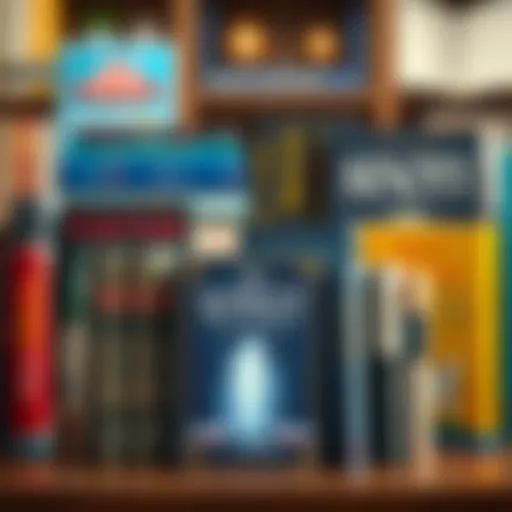Finding Your Next Book: A Strategic Reading Guide


Intro
Selecting the right book can feel like searching for a needle in a haystack. The literary world is vast and teeming with choices, where every cover promises unique adventures and insights. For some, a reading journey is not just about flipping through pages; it’s about personal transformation, diving into the core of who we are and what we aspire to be. Books have this remarkable power to both reflect and shape our identities, making the process of choosing one an essential endeavor.
In this guide, we’ll break down the intricate steps for finding a book that resonates with your values, interests, and life experiences. Understanding genres, themes, and personal growth objectives can illuminate your path. Furthermore, we’ll touch upon how digital platforms and community recommendations can play a pivotal role in your selection process. Through tailored recommendations, you'll be more informed when you take that next reading plunge.
Let's roll up our sleeves and get into the nitty-gritty of navigating the literary landscape.
Understanding Personal Reading Preferences
In the vast world of literature, understanding your personal reading preferences is a crucial step in finding the perfect book. It's like knowing your taste in food before you step into a restaurant. If you don't understand what flavors excite you, how can you expect to enjoy the meal? The same goes for books; aligning your choices with your interests elevates the reading experience and makes it more fulfilling.
Deciphering your reading preferences involves more than just picking up what’s trending. It requires contemplation about your interests, values, and even your emotional needs. This self-awareness can guide you in selecting narratives that truly resonate with your personal growth, emotional landscape, and intellectual curiosities. Knowing what you enjoy can not only help in refining your book list but also foster a deeper connection with the material.
Understanding personal reading preferences offers many benefits:
- Enhances Your Reading Experience: When you stick to genres or themes that speak to you, the likelihood of enjoying the book increases significantly.
- Saves Time and Effort: Instead of sifting through countless options, a clear understanding narrows your focus, making selection speedy and efficient.
- Encourages Exploration: A defined set of preferences can motivate you to branch out into tangential genres, as you begin to connect the dots between varied topics that pique your interest.
- Fosters Personal Growth: By engaging with books that align with or challenge your values, you cultivate a transformative reading journey that fosters introspection and expands your horizons.
This section lays the groundwork for exploring the nuances of your preferences, ensuring you approach the next phases of your reading journey with a well-informed mindset.
Defining Your Interests
Defining your interests is the first step in understanding what you enjoy reading. It entails reflecting on what truly captivates you. Think back to the books that left a mark on you. Was it a gripping thriller that kept you on the edge of your seat, or perhaps a poetic memoir that resonated with your life experiences? Identifying these patterns can unveil clues about your tastes.
A simple method to clarify your interests is to create a list of your favorite books or authors and analyze the themes they represent. Consider the following questions:
- What genre are these books?
- Do they share common themes, such as love, loss, adventure, or self-discovery?
- Is there a particular period in time or setting that seems to draw you in?
Noting these aspects can lead to precious insight into what makes a book appealing to you. This self-exploration can also include discussing your preferences with friends or participating in online reading communities where you can share and gather insights on literature.
Recognizing Reading Styles
Each reader has a unique way of approaching their reading habits. Recognizing your reading style can tailor your literary journey even further. Some readers may prefer binge-reading entire series, while others savor each page thoughtfully like a fine meal. Observing your inclinations allows you to make informed choices following your natural tendencies.
Here are common reading styles:
- Speed Readers: They skim through texts, focusing on key points and essential ideas.
- Deep Readers: These individuals immerse themselves in the text, often taking notes and rereading passages for deeper understanding.
- Social Readers: They enjoy discussing books with others, frequently participating in book clubs or online forums, seeking connections through shared narratives.
- Contextual Readers: These readers focus on the background and context of the books, such as history, culture, and author's background, enhancing their understanding of the material.
Attempting to fit yourself into a fixed category might not capture the nuances of your reading style. Instead, remain open to experimenting with different approaches to discover what best supports your engagement and enjoyment.
By grasping your interests and recognizing your reading style, you pave the way for a more fulfilling and tailored literary experience. This understanding equips you to venture confidently into the diverse world of genres and themes, as jointly discussed in the next section.
Exploring Different Book Genres
Understanding book genres is like being handed a treasure map in the world of literature. Each genre serves as a different route, leading readers through diverse landscapes of ideas, emotions, and narratives. By familiarizing oneself with the various book genres, readers gain the ability to pinpoint what resonates with their personal tastes and aspirations. Furthermore, exploring genres broadens horizons, unveiling new voices, themes, and styles that may have otherwise remained undiscovered.
Fiction and Its Many Faces
Fiction is often seen as the heart of literature, displaying a kaleidoscope of creative expression. From the classic realms of literary fiction to the pulse-quickening tales of historical fiction, the choices are practically limitless. The beauty of fiction is its ability to reflect human experiences, whether situated in reality or spun from the imagination.
When diving into fiction, consider delving into sub-genres that might not always grab the spotlight. For example, appears speculative fiction, which melds reality with elements of fantasy or science fiction. Books like “The Night Circus” by Erin Morgenstern allure with their enchanting plots. Exploring the many faces of fiction means not being afraid to try something different. You may just stumble upon a genre that becomes a staple in your reading list.
Non-Fiction Insights
Non-fiction often serves as a mirror reflecting our world back to us. It's filled with real stories, factual accounts, and self-help inspirations. The realm of non-fiction is expansive—ranging from biographies to history, essays to science. Reading non-fiction can be enlightening, opening doors to new perspectives.
One important insight is to approach non-fiction with an inquisitive mindset. For instance, if you're interested in personal finance, a book like “The Total Money Makeover” by Dave Ramsey can provide practical advice. It's much like having a seasoned mentor guiding you through financial decisions. Each turn of the page offers opportunities for personal growth that fiction might not always provide.
Thriller, Mystery, and Suspense Literature
As tension builds and the plot thickens, the genres of thriller, mystery, and suspense keep readers on the edge of their seats. These books harness the power of anticipation, often leading to unexpected twists and thrilling conclusions. They invite readers to become amateur detectives, piecing together clues while racing to the last chapter.


When choosing a book from this category, diverse styles can be found. For example, “Gone Girl” by Gillian Flynn underscores the complexities of relationships while entrenching readers in a compelling mystery. It is crucial to identify what kind of suspense holds your interest—whether psychological, crime-related, or maybe even supernatural.
The World of Fantasy and Science Fiction
Fantasy and science fiction whisk readers away to alternate realms, offering a break from the mundane. Encompassing everything from epic adventures with dragons to space odysseys, this genre stimulates the imagination immensely. Often these narratives encapsulate themes of good versus evil, the struggles of humanity, and the quest for knowledge, appealing to those who ponder beyond the stars.
Consider the depth provided by works such as “Dune” by Frank Herbert or “The Name of the Wind” by Patrick Rothfuss. Authors within this genre unify complex world-building and character development with imaginative plots. Engaging with fantasy and science fiction can also lead to the exploration of important cultural and ethical dilemmas that have a grounding in reality, despite the surreal settings.
Memoirs and Personal Narratives
Memoirs and personal narratives grant readers an intimate glimpse into the lives of others. They showcase real experiences, struggles, and triumphs, often resonating with universal themes of identity, resilience, and self-discovery. Engaging with these texts can provoke reflection on one's own journey.
Take “Educated” by Tara Westover as a notable example; it recounts the author's ascent from a strict upbringing into the world of academia. The rawness of personal narratives has a way of drawing readers into the emotional core of the story. It’s like conversing with a friend over coffee, where vulnerability becomes a shared experience, offering wisdom and lessons learned along the way.
Exploring different book genres is not merely about choosing what to read next; it’s about expanding horizons, broadening understanding, and connecting with a myriad of perspectives. Whether you lean towards the fantastical, the factual, or the suspenseful, knowing the landscape of genres can only enhance your literary journey.
Identifying Themes for Personal Growth
Identifying themes for personal growth in literature can be a pivotal choice in one's reading journey. This particular aspect combines the quest for knowledge, self-awareness, and emotional intelligence, leading readers to not only immerse themselves in content but also emerge as well-rounded individuals. With each page turned, there’s an opportunity to reflect on life, understand complex emotions, and gain insights that can influence both personal and professional lives.
One must consider the importance of themes when selecting reading material. Themes often reflect universal experiences, making them relatable across diverse backgrounds. They can highlight struggles and victories that resonate on a very personal level, encouraging readers to tackle their own challenges and aspirations. Understanding these themes not only fosters empathy but can also inspire action towards improvement in various aspects of life.
Self-Improvement Literature
Self-improvement literature is a vast ocean of texts that promise to enhance personal skills and foster growth. This genre ranges from practical guides on productivity to books focusing on emotional and mental well-being. The beauty of self-improvement books lies in their ability to offer strategies that are easily integrated into daily routines. One powerful title to consider might be Atomic Habits by James Clear, which emphasizes small, incremental changes that can lead to significant improvements over time.
Choosing the right self-improvement book often involves identifying specific areas one wishes to develop. This could be anything from communication skills, personal finance, to mental health. Not every self-help book will resonate equally. Reading reviews and summaries can help pinpoint those that align with your goals. In this digital age, platforms such as Goodreads can be your trusty compass.
Philosophical Texts and Existential Exploration
Philosophical literature stands apart as it delves into the fundamental questions of existence, purpose, and morality. Works like Meditations by Marcus Aurelius or Sartre’s Being and Nothingness can provoke a deeper understanding of one’s place in the world and inspire readers to search for meaning within the chaos of life. The beauty of philosophy is that it doesn’t just provide answers; it challenges readers to ask the right questions.
Reading philosophical texts encourages critical thinking. It's not just about absorbing information — it’s about wrestling with ideas that can significantly shift perspectives. The challenge lies in grappling with dense concepts and finding personal resonance amidst abstract thoughts. Engaging with philosophical works can be a daunting yet rewarding experience that contributes substantially to personal growth.
Exploring Historical Contexts
Historical literature offers another lens through which one can explore personal growth. Delving into different eras can provide context for today’s social structures, cultural issues, and human behaviors. Books like Sapiens by Yuval Noah Harari or Guns, Germs, and Steel by Jared Diamond challenge readers to consider how historical forces shape current realities. Understanding the past enables a better comprehension of the present, which often leads to wiser decisions in personal and professional lives.
Moreover, reading historical narratives can instill a sense of resilience. The trials and tribulations of those who lived before us can serve as lessons in perseverance. Themes of struggle, survival, and innovation echo throughout history, reminding readers that growth often comes from overcoming adversity.
Utilizing Digital Platforms for Book Discovery
In today's tech-savvy world, the way we discover books has shifted dramatically. Gone are the days of solely relying on recommendations from friends or browsing local bookstores. Digital platforms now play an essential role in book discovery, allowing readers to connect with literature that resonates deeply with their personal interests. This section explores how utilizing these platforms can significantly enhance your search for the next great read.
Online Book Retailers and Recommendations
Online bookstores such as Amazon and Barnes & Noble are not just places to purchase books; they are sophisticated recommendation engines. When you browse these sites, you'll often see sections like "Customers who bought this also bought" or curated lists based on trending topics. This feature can help readers discover new titles that may not be on their radar.
- Personalized Suggestions: These retailers use algorithms to analyze your past purchases and browsing behavior, tailoring their recommendations. This means the more you engage with the platform, the better it gets at suggesting books you might enjoy.
- Reviews and Ratings: Before making a purchase, you can read through reviews from other readers. This peer feedback can provide insight into whether a book will meet your expectations.
- Sales and Discounts: Keep an eye out for sales or daily deals that can introduce you to new genres or authors at a lower cost. You never know when a bargain may lead you to your new favorite read.
E-Readers and Apps for Accessibility
E-readers like the Amazon Kindle or Kobo are blessings for passionate readers. Not only do they house entire libraries in a compact device, but they also come with features that enhance the reading experience. Here’s what makes them special:
- Portability: Carry thousands of books without the extra weight. Whether you're commuting or traveling, you can have your entire reading list on hand, ready to go.
- Customization: Most e-readers allow users to adjust font sizes, background colors, and brightness, making the reading experience more comfortable.
- Content Discovery: Many e-readers come with built-in stores that allow you to browse and download titles directly. They're often linked to one’s reading history, suggesting materials based on what you've read before.
- Features for Accessibility: Highlighting, note-taking, and even text-to-speech options make e-reading accessible to a broader audience, catering to those with varying needs.
Exploring Literary Blogs and Websites
The internet is teeming with blogs and websites dedicated to all things literature. These platforms can provide a depth of insight and diverse viewpoints, essential for making informed choices about what to read next.
- Book Reviews: Websites like Goodreads and Book Riot feature extensive reviews of both popular and obscure titles, helping you gauge what to expect from a book.
- Themed Lists: Many literary blogs curate themed reading lists—be it the best books for summer vacation or powerful voices in contemporary literature. These lists can spark ideas for what to dive into next.
- Author Interviews and Insights: Some literary sites conduct interviews with authors, offering behind-the-scenes looks at their works. Understanding an author’s thought process can enhance your appreciation of their writing.
- Community Engagement: Platforms such as Reddit also host vibrant communities where readers discuss different genres and share recommendations. Participating in these discussions can lead you to hidden gems you might otherwise miss.
In summary, leveraging digital platforms for book discovery is an excellent way to expand your reading horizons. From the extensive selections offered by online retailers to the immersive experiences provided by e-readers, and the rich insights gleaned from literary blogs, the resources at your fingertips are vast. Remember, the right book is out there, just waiting for you to stumble upon it!


Engaging with Literary Communities
Engaging with literary communities is a vital aspect of finding your next book. These communities offer a wealth of insights and perspectives that not only enrich your reading experience but also connect you with like-minded individuals who share a passion for literature. The benefits of being part of these circles are manifold, ranging from robust discussions to new recommendations that may not be on your radar.
Being involved in literary communities can help you clarify your own reading preferences. Discussions with fellow readers often illuminate themes, styles, and authors that resonate with others, prompting you to explore ideas or genres you may have overlooked. Moreover, these interactions provide a nuanced understanding of books, considering various cultural or contextual lenses. As the old saying goes, "Two heads are better than one." This becomes particularly true in the realm of literature, where diverse opinions can broaden one's perspective on a book.
Furthermore, being part of these groups promotes accountability. If you’re part of a book club, for instance, you’re much more likely to finish a book on time, knowing that there’s a discussion scheduled. This sense of community also aids in deepening your overall engagement with the text. It’s not just about reading alone; it’s about sharing and discussing it with others. The connections built in these groups often extend beyond the pages, fostering friendships that can last a lifetime.
Book Clubs and Reading Groups
Book clubs and reading groups serve as one of the most accessible forms of literary community. They can take many shapes, from formal clubs with scheduled meetings to informal gatherings of friends discussing the latest bestseller. The structure allows members to delve deeper into the text, encouraging critical thinking and exploration of themes. Each participant brings their unique perspective, making discussions dynamic and enlightening.
A key advantage of book clubs is the selection process. Often, members take turns choosing books, which means you’re likely to encounter works that you might not have selected on your own. This variety is crucial as it exposes you to different genres, styles, and authors. In turn, this broadens your literary horizon and challenges your preconceived notions about what constitutes a good read.
Moreover, these meetings can facilitate lively debates. Whether it be about a character’s moral ambiguity or the plausibility of the plot, the discussions often ignite a passion for the subject matter. In essence, book clubs transform reading from a solitary activity into a communal experience, enhancing the overall enjoyment of literature.
Online Forums and Social Media Discussions
The advent of the internet has transformed how readers engage with literature, birthing a plethora of online forums and social media platforms. Sites like Reddit or Facebook host groups dedicated entirely to book discussions. These platforms provide an endless supply of opinions, reviews, and recommendations.
Navigating through social media allows you to explore niche genres and discover hidden gems. Platforms like Goodreads offer community ratings and reviews that can guide your choices, while also enabling you to track your reading journey. Users frequently share their personal insights, and their book lists can be incredibly helpful in curating your own.
Interactions on these platforms differ from those in traditional settings. Chats can be instantaneous, leading to spontaneous discussions about pressing topics in the literary world. Whether it’s a trending book or a newly released novel, you can engage with readers globally, bringing a richer diversity of thoughts and experiences to your literary journey.
Evaluating Book Summaries and Reviews
In the digital age, the sheer number of books available can feel like a double-edged sword. On one hand, there's no shortage of material to immerse yourself in; on the other, the options can be overwhelming. This is where the importance of evaluating book summaries and reviews comes into play. Having a solid grasp on how to assess summaries helps in understanding whether a book aligns with your reading objectives and personal interests. It allows for a more thoughtful approach to selecting your next read, providing an informed method of narrowing down choices.
Understanding Summary Formats
When we think of book summaries, they can come in various formats, each designed to serve different purposes. Some of the most common formats include:
- Brief Overviews: These are concise summaries that cover the main plot points without diving deep into character development or thematic elements. Useful for a quick decision.
- Detailed Summaries: These delve into the chapters, elucidating major events, character arcs, and sometimes even the underlying messages of the text. They are beneficial for readers who want to gauge the depth of a story.
- Critical Summaries: Featuring reviews combined with summaries, these not only summarize the book but also provide an analyst's perspective on the effectiveness of the story and its delivery.
While reviewing these formats, focus on the clarity and coherence of the summary. Besides, take note of the tone; does it resonate with your perspectives and interests? A good summary should entice rather than overwhelm.
Analyzing Author Reputation
Understanding an author's background and reputation can greatly influence your reading experience. An author's previous works, their engagement with readers, and their standing within literary circles hold insights into their writing style and reliability. Here are a few considerations:
- Prior Works: Have you read anything written by them before? Familiarity can lead to more insightful results in assessing new works. Established authors often have a recognizable flair that caters to particular audiences.
- Critical Reception: What do literary critics say about the author? Reviews in well-known literary circles or platforms like Britannica or Goodreads can shed light on whether their past offerings have garnered acclaim or criticism.
- Public Engagement: An author's interaction with their audience on social media or through author talks can indicate their passion and commitment to their work, impacting your perception of their writing.
"An author's voice often echoes through their work—understanding this can help identify what literary path resonates with you."
By keeping an eye on these elements, you afford yourself a broader understanding of the landscape of literature. Evaluating summaries and reviews empowers you to navigate through countless titles more efficiently, ensuring that the next book you pick aligns with your reading preferences and goals.
Useful Resources
Navigating literature is not merely about choosing any book; it is about selecting one that speaks to you personally. By refining your skills in evaluating summaries and author reputation, you establish a clear pathway to a more rewarding literary journey.
Making the Choice: Picking Your Next Read
When it comes to navigating the boundless sea of literature, the process of selecting your next read is not just a simple task; it's an art form. The choices that one makes in this regard can either ignite a passion for new ideas or lead to moments of regret. Thus, understanding how to effectively choose a book is pivotal in shaping your literary experience.
Balancing Expectations and Interests
Striking a balance between what you expect from a book and what genuinely piques your interest is crucial. It’s like walking a tightrope; lean too far in one direction, and you might miss out on hidden gems.
First, let's consider your expectations. Are you looking for something that challenges your thoughts, or are you seeking pure escapism after a long day? Knowing what you want can filter out countless options that may not serve your needs.
On the flip side, your interests shouldn’t be pushed aside. Reading is personal. A historical fiction novel might appeal to a history buff, while a mystery-thriller could resonate hugely with someone who loves a good puzzle. Here are some questions to reflect on to help you find that sweet spot:


- What genres have captivated you before?
- Are there particular authors whose writing style you adore?
- Would you prefer to explore new themes?
Once you have your priorities straight, it becomes easier to browse through lists, whether they’re curated by Goodreads, your local library, or a simple online search. The beauty of our digital age is that recommendations can come from like-minded readers on platforms such as Reddit or specialized book blogs.
Trial and Error in Book Selection
The reality of picking books often involves a fair bit of trial and error. Not every book with a shiny cover or a high rating is going to meet your unique taste. In fact, sometimes the requisite to discovering your next great read lies in the books that ultimately don’t hit the mark.
There’s a certain simplicity in embracing this process. When you pick a book, challenge yourself. Dive in fully, even if the first few chapters seem daunting or boring. You never know, it might just take a chapter or two to get into the groove of the author’s voice or the story’s rhythm.
Here are some practical strategies to ease the journey of trial and error:
- Sample Before You Commit: Many platforms allow you to preview the first few pages. Get a feel for the writing style.
- Keep a Diversified Reading List: Mixing genres can help prevent burnout and keep your reading life spicy. You may find yourself pleasantly surprised by a fantasy novel when you usually stick to non-fiction.
- Join Discussions: Share your experiences with others. Online readers’ communities can provide insights into why someone loved a book or why it fell flat.
In the long run, trial and error nurtures your intuition about what resonates with you. So, don’t be discouraged by a few missteps. Every reader’s journey includes the occasional stumble, but those moments often lead to important insights—that may ultimately help refine your next choice.
"Reading is a way for me to expand my mind, open my heart, and ignite my imagination." - Oprah Winfrey
By balancing your expectations and interests, while embracing the trial-and-error process, you set the foundation for a rich, fulfilling reading experience. The beauty of literature lies not just in what you choose to read next but in the journey you undertake. Happy reading!
Reflecting on Your Choices
Reflecting on your choices in literature goes beyond simply picking the next book off the shelf. It is a process that allows you to delve deep into your personal reading journey. This section sheds light on why this reflection is important, exploring specific elements that contribute to a more enriching literary experience.
One of the significant benefits of reflecting on what you’ve read is that it helps you understand your own preferences better. Keeping track of your reading history—is it a chore or a personal insight? Regularly assessing the genres, themes, and styles you've resonated with can clarify what truly captivates your attention. It’s like holding a mirror to your literary tastes, helping you evolve as a reader and foster a deeper connection with books.
Keeping Track of What You Read
Tracking your reading isn’t just about numbers or lists; it serves as a journal of your literary life. Consider maintaining a reading log. This can be a simple notebook, a digital spreadsheet, or even an app designed for tracking books. Record not just the titles, but also your thoughts and emotions as you navigate through each story.
Here are some effective methods to keep track of your reading:
- Reading Log: Keep a physical or digital journal where you note the title, author, and date finished. Add a few lines about what you liked or disliked.
- Online Platforms: Websites like Goodreads allow you to catalog your reads, read reviews, and even get recommendations based on your readings.
- Reading Apps: Consider apps like Libby or Blinkist, which not only track but also permit you to access digital books and summaries on-the-go.
Having a record can help you identify trends in your choices. Are you veering towards sci-fi or have you been on a memoir spree? Recognizing these patterns can greatly assist you when making your next reading choice.
Assessing Impact and Learning
After turning the last page of a book, take the time to ponder its impact. This isn't merely a reflective moment; it’s a crucial part of the learning cycle that reading offers. Ask yourself: What did I learn? How did this book challenge my perceptions? Did it spark curiosity about a new subject?
The ability to assess a book’s impact can lead to profound personal growth:
- Critical Thinking: Analyzing characters, plots, and themes cultivates critical thinking skills. You begin to ask deeper questions about the narrative and its relevance to your own experience.
- Broader Perspectives: Engaging with diverse authors opens your mind to viewpoints and experiences that might be different from your own. This enhances empathy and understanding of others.
- Knowledge Expansion: Certain books might inspire a desire to explore particular topics further. Whether it’s history, psychology, or various cultures, a good read can ignite a passion for learning.
“Reading is the gateway drug to a world of ideas; it opens your mind to thoughts and experiences beyond your own.”
Reflecting on the insightful or emotional depth of your literary selections can become a valuable exercise. Not only does it benefit your ongoing literary journey, but it also enriches your personal and intellectual growth, creating a feedback loop that amplifies your reading experience. Remember, what you choose to read is a reflection of who you are and who you aspire to be.
For more resources and tools on tracking your reading or assessing impacts, consider visiting Goodreads, or check literary discussions on platforms like Reddit.
Continuing Your Literary Journey
In the grand scheme of life, reading is not just a pastime; it’s a journey. A journey that evolves with every page turned and every story swallowed whole. Continuining this literary voyage after a book’s final line enriches a reader’s experience and informs their growth. This part of the article explores how readers can not only appreciate the literature they've consumed but also look ahead to future discoveries.
Setting Future Reading Goals
Setting goals for your reading endeavors can transform your approach toward what to tackle next. Think of this as creating a personal literary roadmap. Perhaps you've finished a compelling historical fiction novel that stirred your curiosity about a specific period. Why not set a goal to read at least three more books related to that era or topic? This kind of focused exploration not only broadens your horizons but also hones your expertise in subjects that intrigue you.
- Identify Your Interests: To set manageable reading goals, take a moment to think about what you enjoy. Are you drawn more to poetry, gripping thrillers, or expansive fantasy worlds? Pinpointing these interests will guide your choices down the line.
- Diversify Your Selection: While honing in on particular genres is essential, don't shy away from dipping your toes into various waters. Set a target that includes a mix of genres or themes. This way, you can challenge your palate and discover new favorites.
- Establish Timelines: Determine how many pages or books you'll tackle within a specific timeframe. Whether it’s aiming to read one book a month or setting aside 30 minutes a day, define a structure that suits your schedule.
"Reading gives us someplace to go when we have to stay where we are." – Mason Cooley
Developing literary goals is about fostering a habit that nourishes your mind. Consider employing tools like bullet journals or reading apps such as Goodreads to track your progress. Having a visual representation of your achievements can mitigate inactivity and inspire further exploration.
Embracing Lifelong Learning
Reading is inherently tied to learning, and embracing this creates a more profound relationship with literature. Often, it’s tempting to dismiss books once they've served their purpose, but the lessons learned can echo throughout the years. Lifelong learning through reading opens up a treasure trove of insights, ideas, and new perspectives.
- Connect Literature to Real Life: Choose books that challenge your perceptions or that relate to current events. Reading non-fiction works, for instance, can provide context to social issues and foster a deeper understanding of the world around you.
- Discuss and Share: Engage in conversations with literary groups, book clubs, or online forums. Discussing themes and perspectives helps cement what you’ve learned and offers new viewpoints that you might not have considered before.
- Continuous Curiosity: Always remain hungry for knowledge. Step outside your comfort zone and try reading books by authors from diverse backgrounds or focusing on unfamiliar cultures. This exposure enhances empathy and broadens your world view, creating a deeper sense of connection within our global tapestry.
As we continue our journey through literature, remember that each book is a stepping stone toward a greater understanding of oneself and the world. Chart your course wisely, and with each read, embrace the knowledge and experiences that literature brings to your life.















